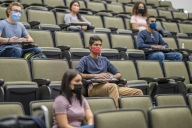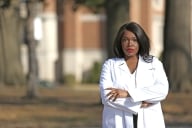You have /5 articles left.
Sign up for a free account or log in.
LGBTQ+ students attending Christian colleges and universities with anti-LGBTQ+ policies are 15 times more likely to report that their sexuality or gender identity kept them from being accepted by others on campus compared to their peers, according to a new survey of 3,000 students conducted by the surveying company College Pulse on behalf of the Religious Exemption Accountability Project (REAP), which promotes equality for LGBTQ+ students at Christian colleges. (College Pulse conducts surveys for Inside Higher Ed's Student Voice project, but Inside Higher Ed played no role in this survey.)
Many Christian colleges have policies that restrict students from expressing their LGBTQ+ identities.
“Not only are LGBTQ+ students more likely to feel like they do not belong to their campus community, they are also more likely to experience disciplinary action from their institutions themselves. Some face mandatory counseling, reparative therapy, and loss of campus privileges when their identities are brought to the attention of campus administration,” Paul Carlos Southwick, the director of REAP, said in a statement. “What’s more: This discrimination and abuse is funded by taxpayers. These findings should serve as a wake-up call for all higher education stakeholders to address the ongoing abuses taking place at publicly funded institutions.”
The survey found that 11 percent of students attending Christian colleges identified as non-heterosexual -- when the researchers used a broader definition that encompassed any attraction not between a heterosexual female and a heterosexual male, the percentage increased to about 22 percent -- and 2 percent identified as a gender minority (nonbinary, genderqueer, agender, transgender or non-cisgender). This compares to about 15 percent of members of Generation Z (individuals born between 1997 and 2002) who identify as LGBT nationally, according to a recent Gallup poll.
The majority of LGBTQ+ students are to a large degree closeted on their campuses: 19 percent indicated they’d told no one on campus about their sexual or gender identity, while another 18 percent said it was known to one or two people on campus and another 19 percent said it was known to three to five.
Non-heterosexual students were three times more likely to experience depression or anxiety compared to their heterosexual peers. Transgender students and others identifying as gender minorities were nearly five times more likely to experience bullying and harassment, and seven times more likely to report being sexually assaulted on their campuses compared to cisgender students.
"Nearly half of gender minority students and one-third of sexual minority students say they do not feel like they belong on their campus," says the survey report, which can be downloaded from REAP's website by signing up for the group's mailing list.
The survey reached students at 184 colleges, the vast majority of which are members of the Council of Christian Colleges and Universities (the sample also included some non-CCCU members, including Bob Jones and Liberty Universities, both of which are evangelical Christian, and three campuses of Brigham Young University, an institution affiliated with the Church of Jesus Christ of Latter-day Saints). The survey went to students attending colleges that, according to the report, "explicitly discriminate against LGBTQ+ students."
Inside Higher Ed shared the executive summary of the report with CCCU. “While we were not given the opportunity to review the full survey results before commenting, we take these types of findings seriously, and are interested in both reviewing and learning from these reported results,” the organization said in a statement. “The CCCU has supported a line of research over the last decade on the experiences of LGBT students at Christian colleges that has been and continues to be published in peer-reviewed journals and in more accessible book form.
“CCCU institutions ascribe to a number of biblical convictions that are considered counter-cultural, including a historic, biblical understanding of marriage as part of broader religious convictions around human sexuality and gender,” the group said.
“CCCU institutions desire to be places where all students feel safe, supported, and welcome. We know the college experience can be stressful, and even more so for LGBT students who are working to understand how their sexual orientation or gender identity intersects with their personal faith. CCCU institutions serve diverse student bodies, and work to care for all students. Bullying, harassment, and assault are not acceptable on any campus, and students must believe and feel that they are created in the image of God and therefore possess full dignity, value, and worth.”
Jonathan Coley, an assistant professor of sociology at Oklahoma State University, analyzed student handbooks of each of the nearly 700 Christian colleges and universities in the U.S. in 2014, and found that nearly a third maintained bans on "homosexual acts or homosexual behavior" in their student handbooks. "The vast majority of schools that maintained bans on homosexual acts or homosexual behavior are affiliated with the CCCU," Coley said.
Coley said the findings “underscore the importance of LGBTQ+ student groups on Christian college and university campuses because studies have shown that when students are able to join LGBTQ+ student groups, they’re connected to others on campus who can help them navigate some of the challenges they’re experiencing. Students who join LGBTQ+ student groups are less likely to report mental health challenges, more likely to gain friendships, more likely to graduate from college,” he said.
“The vast majority of Christian colleges and universities that are associated with the CCCU lack LGBTQ+ student groups,” added Coley, who gathered data on this subject in 2019. He found that 47 percent of institutions that are affiliated with Christian denominations have LGBTQ+ student groups, but the majority of those were not affiliated with the CCCU and instead were associated with the Roman Catholic Church or the United Methodist Church or other mainline Protestant denominations.
LGBTQ+ students across a range of higher education institutions, not only Christian colleges, report more mental health challenges compared to their non-LGBT peers. A national study of LGBT students across more than 900 institutions led by Rutgers University researchers and published in 2018 found that LGBT students were at least three times more likely than their straight and cisgender peers to report to report self-harm, suicidal ideation or suicide attempts in the prior 12 months, and they were at least twice as likely to report experiencing depression.
Yaz Mendez Nuñez, the co-executive director of Soulforce, a national nonprofit that sponsors the Religious Exemption Accountability Project, said the findings around mental wellness of LGBTQ+ students on Christian campuses are really important.
"The nonaffirming Christian rhetoric might tell you that students are suffering because they’re LGBTQI," said Mendez Nuñez, who uses "they" and "them" pronouns.
“But we know that LGBTQI are not suffering because they’re LGBTQI," they said. "They’re suffering because they’re living in cultures of shame and cultures of fear and guilt and isolation and being told that their most authentic selves are incompatible with their most authentic faith."







![First text message: "Yes?" Second message: "This is embarrassing to say, but law school isn't fair for us men, the women are always outperforming us at [sic]. It's obvious women are taking over the legal profession nowadays." Third text: "Who is this?"](/sites/default/files/styles/image_192_x_128/public/2024-09/Text_messages_law_2.jpg?itok=0QWP419B)